Gabriel Boric, president of Chile: ‘The left in Latin America has had a tendency not to take responsibility for its own mistakes’
In an interview with EL PAÍS, the Chilean head of state reviews his time in office and addresses his political future. ‘The depth of the changes we imagined went against the grain of what the majority of people wanted. We changed our priorities and our speed, but not our principles,’ he says, at the halfway point of his administration
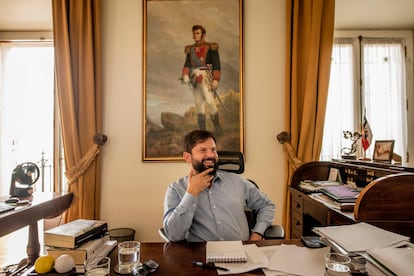
On March 11, 2022, Gabriel Boric Font assumed power at only 36 years of age, with his entire future ahead of him. He was the leader of a new Latin American left, a president destined to heal the wounds of the Chilean revolt of 2019 and bury the Constitution born during the dictatorship of Augusto Pinochet. In those days — in a continent always in turmoil — Boric embodied the hope of progressives across the Global South.
Two years later — while he hasn’t lost his international aura — reality has taken its toll on Chile’s young president. The former student leader governs with low approval levels (although they’re a bit higher than his immediate predecessors). Two constitutional reforms have failed at the ballot box and some of his most important allies have been struck down by scandals or governing crises. And, what’s most disturbing is that Chile — a country that has a strong extreme-right — is facing a specter that it’s not accustomed to: insecurity.
There are many problems in Chile. And the time left in his mandate is short. But Boric — far from throwing in the towel — appears determined to fight on. In the two years that remain in his term, he’s made it a priority to improve pensions, spark economic growth and get crime under control. “Democracy has to deliver; and to the extent that we can improve people’s quality of life, we’ll be moving in that direction. This is how you have to confront the extreme right,” Boric explains to EL PAÍS, during a conversation in his office in La Moneda, Chile’s presidential palace.
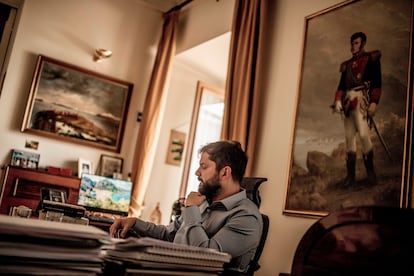
It’s Saturday in the capital of Santiago. A crystal sun shines outside. The president — in his shirtsleeves — mentions how, two nights ago, he prepared a barbecue at his house for Spanish Prime Minister Pedro Sánchez, who was visiting the capital. “I know he likes his steak,” Boric jokes.
On his desk — piled high with papers — there’s a copy of A New World Begins, a thick, well-thumbed volume on the French Revolution by American historian Jeremy D. Popkin. Behind him, there’s a portrait of the Chilean liberator Bernardo O’Higgins (1778-1842) and, across from the president, there’s a large poster that was printed on the 50th anniversary of Pinochet’s coup d’état (1973), with the black-and-white faces of the disappeared. “So as not to forget where we come from,” the Chilean head of state notes, before sitting down. He won’t get up during the entirety of the one-hour-long interview.
In the first minutes of the conversation, songs from the experimental album A Saucerful of Secrets, by Pink Floyd, will play in the background. It’s a vinyl record, selected by Boric himself. Later in the conversation, the record will end up spinning in silence.
Question. How do you judge these first two years of your mandate? Are you happy with your progress?
Answer. This isn’t a space to talk about happiness. There are so many challenges, unforeseen events, tragedies... But I wake up every day very motivated and eager to work.
Q. And did you expect the presidency to be like this?
A. This is an unmatched, unique responsibility. You never know what to expect. Each presidency has different challenges… and these difficulties shouldn’t be seen from a perspective of victimization, but rather as unique to the position.
Q. If you could go back, would you change anything?
A. How far back?
Q. Let’s say March 11, 2022.
A. There are many things that could have been done better. This government has a peculiarity: the coalition that supports it was forged in the second electoral round and, therefore, lacked a culture of working together. This is something that’s been difficult to develop, but [something that] we’re going to achieve. And regarding specific public policy decisions, I think that having bet so much on the outcome of the first constitutional process (September 2022) — and having postponed important reforms based on it — is something that I would do differently today. We suffered two very strong electoral defeats practically in the first year — 2022 — and that implied a shift in priorities. Sometimes, I’m criticized for veering off in [different directions], but that’s necessary in politics, as well as in a world that’s changing very, very quickly. One has to know how to adapt.
Q. Where have you veered off to? Towards a more moderate left?
A. For progressive ideas, such as social justice and equality, to advance, it’s necessary for the left and the center-left to work together. [In Chile], we’ve strengthened that alliance. We’re working toward the same direction, without denying that there may be different visions on certain points.
Q. During your mandate, there were two attempts to change the Chilean Constitution. Both failed at the ballot box. You yourself recognized the boredom and frustration generated by that process. Was the time wasted? Where did you go wrong?
A. It wasn’t wasted at all. It was a learning experience. No country can always be successful in its initiatives. And I believe that, at some point — although not in this government — the discussion will have to be resumed, because the Constitution has to be updated. In both processes — both on the left and on the right — it was thought that a final result could be reached without considering the opinions of those who were, at that moment, circumstantially in the minority. But minorities and majorities in democracy always change. In the end, the people didn’t feel represented.
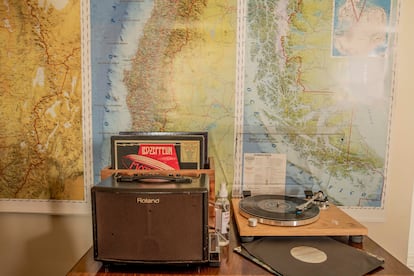
Q. And what does it mean for a left-wing president not to have been able to overcome the Constitution of 1980 — which was written under the Pinochet regime — during his mandate?
A. That’s a question that should be asked of all the progressive former presidents of Chile.
Q. But you had the possibility of doing it…
A. I don’t think it’s something attributable to personal responsibility. Of course, I would have liked it: I wanted a new Constitution, born in democracy, out of a public, deliberative debate that would [have united us] as Chileans. But that failed via the same deliberative process.
Q. The project for a new Constitution was born as an institutional response to the 2019 protests. Aren’t you afraid that its failure will deepen social disenchantment and favor far-right tendencies?
A. During the 2019 crisis, we managed to face the problem with more democracy, not less. And that was a virtue of everyone, of the political system as a whole. Even though the two constitutional projects have been rejected [under my administration], the fact that we followed that path and not another is a success that strengthens Chilean democracy. But there’s an interpretation that differentiates us from the right. They speak about a criminal outbreak and a coup d’état, as if what happened in October 2019 (the beginning of the student protests) was reduced to violence committed by hordes of irrational people. I don’t deny that there was unacceptable violence, but there was also a mobilization that put issues at the center of debate that the political system still hasn’t been able to resolve.
The clearest example of this is the pension reform. We’ve been arguing about this for more than 10 years. But if that problem — just like the housing deficit, mental health, or women’s rights — isn’t addressed substantively, as I believe we’re doing in our government, but is simply swept under the rug, the conditions will be met for this unrest to grow. [It will then] lead to authoritarian or populist routes of any kind, not just right-wing ones.
Q. Do you fear that in the next Chilean presidential elections there could be a far-right phenomenon, like that of Javier Milei in Argentina?
A. This phenomenon already exists here and has influenced the positions of the traditional right: it’s what the Chilean Republican Party represents. It’s not something new, in fact. We won the second round of the presidential elections in 2022 against an ultra-conservative candidate (José Antonio Kast) who represents and feels like he’s part of the world of Javier Milei, Donald Trump, Jair Bolsonaro... But the way to combat [this phenomenon] isn’t only through discourse. Democracy has to deliver. To the extent that we improve people’s quality of life, we’ll be moving in that direction. This is how we have to confront the extreme-right.
[In Chile], we’ve reduced poverty, reduced inequality, improved results in public education, increased the minimum wage, bolstered the quality of life with the work-life balance law, and reduced the work week to 40 hours…. And there are challenges that we’re addressing, such as security, which is the main priority for Chileans and where we’re working very hard…
Q. In terms of public safety, what’s being done?
A. More than 30 laws have been approved. We’ve been the government that has carried out the most legislation in terms of security. We’ve strengthened the Carabineros (the Chilean national law enforcement gendarmerie) as an institution in a very significant way. We’ve controlled the entry of [irregular] migrants from the border by using the Armed Forces and we’ve stopped the upward trend in murders. The presence of organized crime — as we’ve seen in the Tren de Aragua case — is one of the main concerns. I think we’re moving in a good direction and those results will be noticeable.
Q. Do you think that Chile is better off today than in March 2022?
A. Without a doubt. We received a country with more than 8% inflation. Now, it’s around 4.5%. We received a country with negative economic prospects and we’ve now begun to grow again. We received a country with serious public safety issues, with increasing violence in [the region of] La Araucanía. We received a socially fractured country. We received a country with absolutely uncontrolled immigration... Not to be complacent, but those who say that nothing has been done and that Chile is on its way off the cliff are completely wrong. The country is better than how we received it.
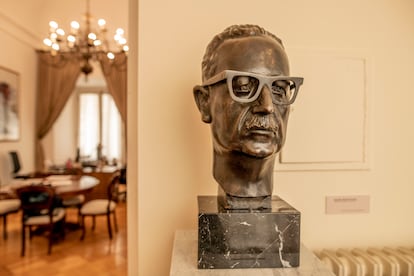
Q. So why does your government have a disapproval rating of more than 60%?
A. Our approval ratings are better than those of the last two governments. Therefore, making an evaluation only with that [single figure] seems whimsical to me and represents a lack of perspective on the general crisis of politics, the crisis of representativeness, which is a global phenomenon. This doesn’t mean that we, as a government — and I, in particular — couldn’t do better. Of course, I would like my administration to have higher approval ratings. What’s more, this will happen as we continue to advance, as the economy grows again [and as we demonstrate] the successes — in terms of security and social benefits — of a progressive government. That’s going to improve. But the numbers we have — which fluctuate between 35% and 28% approval ratings — are better than those of the last two governments. Piñera (who governed from 2010 until 2014 and 2018 until 2022) reached [an approval rating] as low as 7%. You have to look at the data with that perspective. I don’t get anxious about surveys. I prefer [a trajectory] more than the logic of going up a point or two in the weekend poll.
Q. In 2023, graft accusations were made against members of a party within your ruling coalition. How much has this case of political corruption damaged your government?
A. It’s been a disappointment for many people and it’s unacceptable that it occurred. Now, the reaction we’ve had to the [case] is totally different from what was customary in politics. And we’ve made it clear that no one who’s committed illegal acts is protected by the government. Personally, I have complete peace of mind that I haven’t encouraged or protected the people who were involved.
Q. This case resulted in the departure of your historical ally, Giorgio Jackson, who was a minister in your government. But he’s not the only member of your original inner-circle who no longer accompanies you. Are you more alone than you were two years ago?
A. The [office] of the presidency always has a dimension of reflective solitude. It’s evident that Giorgio’s departure was important, but it shows that people aren’t in this government because of friendship or personal relationships, but because of what’s most effective for public policy.
Q. And personally, how did you digest his departure?
A. Personally, it was hard. But personal feelings cannot direct the government. It’s the common good that has to take precedence. That’s the role of leadership.
Q. What’s been the most painful episode for you over the last two years?
A. The most difficult thing — and what implied a change of priorities and a change in the agenda — was the defeat on September 4, 2022 (when a proposal for a new Constitution was defeated by 62% of Chilean voters). It was a call to order and to rediscover the common sense of the people. That’s why I say it’s important to be flexible. Politics isn’t for fanatics.
Q. There’s a part of public opinion that thinks that “Gabriel Boric’s political project has already failed” and that his “transformative purpose has been thwarted.” What do you think about this?
A. The principles of our government remain completely firm. Evidently, the depth of the changes that we imagined at one time went against the grain of what the majority of the population wanted. That’s undeniable. And that means adjusting, but without deviating from our principles. We changed our priorities and our speed, but not our principles.
Q. What’s the top priority for the next two years of your term?
A. When it comes to specific public policies, the priority is to improve pensions, security and resume economic growth. As a political project, [our priority] is to demonstrate that joint action by the left and the center-left is possible. [We want to] demonstrate to the majority of the population that when progressivism governs, their quality of life improves. [And we operate with] principles that are very different from those supported by President Milei in Argentina or Bolsonaro in Brazil, Trump in the United States, Viktor Orbán in Hungary or, here in Chile, José Antonio Kast and the sectors of the right influenced by that type of leadership.
Q. What will be your government’s legacy?
A. Having stabilized the country and materially improved the living conditions of the people, at a time when pessimism prevailed; we’re going to be able to reverse that. And having taken measures that advanced greater social justice and a better distribution of income. Furthermore, I hope that we can form a long-term coalition for a progressive project in Chile. Just as the Popular Front did in the 1930s and 1940s, or like the Concertación (the coalition of center-left parties that ruled Chile after the dictatorship, from 1990-2010).
Q. What do you think of Argentina’s Milei and the president of El Salvador, Nayib Bukele?
A. I’m not going to make personal references. Clearly, we have different political projects, but the evaluations correspond to the people they represent.
Q. You’ve often criticized regimes — such as those of Venezuela, Nicaragua, or Cuba — for their human rights abuses. But it’s striking that other presidents from the Latin American left don’t follow your example.
A. On the left in general — and in Latin America in particular — there’s been a tendency not to take responsibility for one’s own mistakes. It’s an error to defend certain regimes just because they’re understood as being part of the same family. I don’t look at the political color of a person who violates human rights, or who restricts freedoms that are essential. This arouses a lot of widespread criticism: they always hit you from one side and the other. On the left, [we get hit] when we criticize Venezuela or Nicaragua. And the right and the establishment [criticize us] when we raise complaints in the case of the very serious human rights violations that Israel is committing in Gaza. Or in the case of Russia’s war against Ukraine. It cannot be that one closes their own eyes [to the abuses that are committed] by those on their side of the political spectrum and constantly denounces what the other party thinks. People aren’t stupid, and these confusions or deviations are bad for politics.
Q. Which international leaders are you most aligned with?
A. I have an excellent relationship with Pedro Sánchez. With Justin Trudeau, we’ve developed a permanent dialogue and a lot of collaboration. I really like what the general secretary of the Democratic Party in Italy (Elly Schlein) — a young woman — is doing. I think that Lula, without a doubt, is a reference in terms of governance and leadership. Now, I don’t have idols. Politics isn’t a space for idols — we all have lights and shadows.
Q. And what are your shadows?
A. At first, we didn’t appreciate the importance of two fundamental aspects that are a priority in my government today: economic growth and having a very clear perspective on public safety. These are issues that mattered greatly and where better leadership could have been exercised. These are a couple of lessons that I’ve learned along the way.
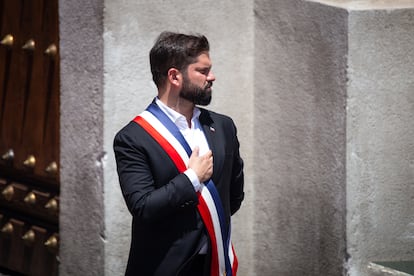
Q. At the recent funeral of your predecessor — President Sebastián Piñera — you made a comment about the role that your political sector played as part of the opposition to his governments (2010-2014, 2018-2022). Why did you mention that?
A. What I pointed out was: “As has happened on other occasions in our political history, there were times when, as the opposition, we got into our own quarrels — referring to political disputes, not judicial ones — and staked out differences beyond what was fair and reasonable.” That’s what I said and I stand by it. Not, by the way, in our unconditional defense of human rights when they were being violated in Chile. But yes, in terms of the personal accusations that were hurled around.
Comparing President Piñera — with whom I had many differences — with the Pinochet dictatorship (as Boric did during the student protests) trivializes what the dictatorship was. And I would hope that this lesson — which we’ve learned as a government — will also be understood by the current opposition.
Q. In the long-term, do you see yourself being president a second time? (Chile does not permit immediate re-election, but a president is welcome to seek office again after a period of four years).
A. Although it’s never good to be too categorical regarding personal plans, it’s in no way within my objectives or my personal aspirations. I would like to continue contributing to improving the country and strengthening the political project of progressivism and the alliance between the left and the center-left, from my home, the Frente Amplio (the Broad Front, his political party). On a personal level, I would like to read a lot more, write and be able to take care of my body, which is something I clearly haven’t been able to do in recent years.
Q. Does the political right have the best chance at succeeding you?
A. Two years before the 2022 presidential election, I was — according to weekly surveys — the lowest-rated politician. Therefore, trying to see the future when there’s so much time left doesn’t make much sense. As a government, we’re not only going to leave a better country than the one we found, but the people are going to appreciate these changes. And this will translate into the continuity of the progressive political project.
Q. The best rated progressive leader in Chile — according to public opinion surveys — is Michelle Bachelet.
A. I have a high opinion of Bachelet. But there are other figures who are going to make people talk in politics. They’re going to make a contribution. I think of [government spokesperson] Camila Vallejo, [Minister of Interior] Carolina Tohá, [Minister of Labor] Jeannette Jara… I think of [former minister of Interior] Izkia Siches, [Deputy] Daniela Cicardini, [Deputy] Karola Cariolo… There’s a replacement out there.
Sign up for our weekly newsletter to get more English-language news coverage from EL PAÍS USA Edition
Tu suscripción se está usando en otro dispositivo
¿Quieres añadir otro usuario a tu suscripción?
Si continúas leyendo en este dispositivo, no se podrá leer en el otro.
FlechaTu suscripción se está usando en otro dispositivo y solo puedes acceder a EL PAÍS desde un dispositivo a la vez.
Si quieres compartir tu cuenta, cambia tu suscripción a la modalidad Premium, así podrás añadir otro usuario. Cada uno accederá con su propia cuenta de email, lo que os permitirá personalizar vuestra experiencia en EL PAÍS.
¿Tienes una suscripción de empresa? Accede aquí para contratar más cuentas.
En el caso de no saber quién está usando tu cuenta, te recomendamos cambiar tu contraseña aquí.
Si decides continuar compartiendo tu cuenta, este mensaje se mostrará en tu dispositivo y en el de la otra persona que está usando tu cuenta de forma indefinida, afectando a tu experiencia de lectura. Puedes consultar aquí los términos y condiciones de la suscripción digital.








































